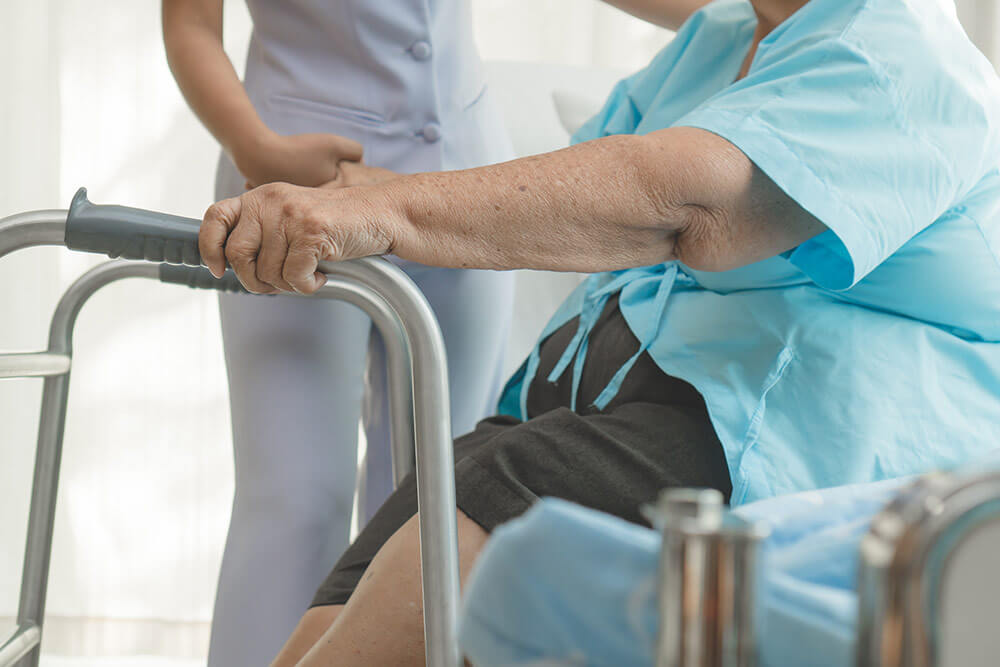Why do older adults stop walking? The answer to this question has to do in part with the passage of time and aging. But we say that it has, because it is not the only cause for this situation that is so worrying for family members and those affected. In this article, the Nomenial team explores this topic.
We must bear in mind that the older the person, the greater the probability that his or her motor system will be affected, and with it, that certain imbalances will even appear.
Imbalances that also cause the first falls in old age and directly influence the loss of walking ability or reduce mobility.
The same thing happens with the muscles over time, as they lose mass, and there comes a point where the person does not have enough muscle and strength to support his weight, so that the ability to walk and autonomy are affected.
In any case, in this article we want to go further, and that is why we are going to indicate in depth which may be some of the factors that cause the older adults to stop walking apart from those mentioned.
Why do Senior Citizens Stop Walking: Factors that cause older people to stop walking
There can be many causes or factors that strongly influence the reason why the older adults stop walking.
These are some disorders, injuries or diseases that can trigger this situation:
Why do Senior Citizens Stop Walking: Appearance of neurological disorders
Neurological disorders directly affect the locomotor system of older people. This causes them to have poor coordination of their movements, physical level, and a more limited capacity to retain information.
Neurological disorders can even cause diseases such as Parkinson’s, Alzheimer’s and various types of dementia, which can affect the mobility of the senior adults.
Why Senior Citizens Stop Walking: Joint pain and disease
Joint pain and the diseases that cause it, such as arthritis or osteoarthritis, can be a major reason why older people stop walking.
Sometimes the pain can become disabling for the person. It is important to talk to the medical specialist to determine what disease or pathology is causing it. In order to begin treatment and improve the condition of the affected person.
Bone loss, broken bones and Osteoporosis cause senior citizens to stop walking
The older a person gets, the more the body tends to reabsorb phosphorus and calcium from the bones. This reabsorption causes them to weaken. Until there is a point in the reabsorption process when experts detect that the person has osteoporosis.
Not surprisingly, older people who stop walking because of a broken bone are not aware that they have lost some of their bone due to reabsorption of calcium and phosphorus.
Foot problems when walking
More than 70 percent of people over the age of 65 have foot problems, which greatly limit their mobility and diminish their quality of life.
It is vitally important to go to the family doctor with the affected family member so that he or she can refer them to a specialist and determine the disease they are suffering from.
Visual problems in senior citizens
Visual problems significantly affect the mobility of older people, since it is difficult for them to calculate distances and differentiate even different shades.
Those affected by visual impairment recognize that they have many limitations when it comes to walking.
A limitation that prevents them from even getting into and out of bed normally. Or getting in and out of a chair.
Visual problems in these older adults greatly limit them in activities such as going for walks, going to places to do errands or do shopping.
Alterations in movement due to Parkinson’s disease
Parkinson’s can present different symptoms with different intensities depending on the person suffering from it.
And among the motor symptoms presented by people who have parkinson’s, such as tremor at rest or rigidity, is bradykinesia (slowness of movement).
In fact, there are also some who have difficulty walking, maintaining balance and postural instability (coordination problems).
Brain accidents such as stroke
A stroke occurs in the brain, as its name suggests, however its effects on the senior people can range from mild, to medium, to severe. It all depends on how severe the stroke was and which area of the brain was affected. Stroke is one of the main triggers for families to hire a carer.
Therefore, the consequences of a stroke can be very different. Among them are those that affect motor function. In the older adults, there may be difficulty coordinating movements, imbalance, dizziness and walking.
These are only some of the disorders, injuries or illnesses that can cause the senior people to stop walking.
Our recommendation is that the affected person be taken by a family member or caregiver to the doctor. This is to determine the exact cause for which he or she is suffering from this condition.
How to make senior citizens mobile
To avoid the deterioration of the mobility of the older adults these are some recommendations:
1. Eat a healthy and balanced diet. A good diet is essential for the seniors so that they do not feel tired and have pain in their legs, as well as good circulation.
Fruits, vegetables, cereals and fiber, in their adequate measure, together with a good hydration and a reduced consumption of salt will help to have a better mobility.
2. Stimulate the older adult’s mind and body. Performing activities for cognitive stimulation and others for active aging improves physical and mental dysfunctions.
Performing low intensity physical activity to keep the body active, such as daily walks, combined with mental stimulation exercises, will make the person feel better physically and mentally.
3. Avoid accidents at home. Falls in the senior people can cause injuries that could make them stop walking. Therefore it is important to minimize the risks of accidents at home. One should study the objects or situations that could cause them.
If necessary, barriers that prevent the person from moving or accessing places with greater security must be eliminated. This is the case of stairs, where there are platforms that allow you to go up and down comfortably.
To conclude, we hope you have understood why the older adults stop walking in certain cases, and the causes that provoke this.
Likewise, we would like to remind you that if a relative of yours is in a situation that prevents or reduces his or her mobility, do not hesitate to call his or her doctor immediately. Or, if it is something urgent, go to the nearest emergency service.







